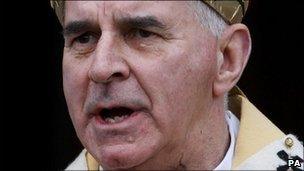Catholic cardinal criticises gay marriages plan
- Published
- comments

Cardinal Keith O'Brien has a reputation as a robust defender of traditionalist Christian teaching
The government's plans for gay marriage have been criticised by the most senior Roman Catholic cleric in Britain.
Cardinal Keith O'Brien, the leader of the Catholic Church in Scotland, said the plans were a "grotesque subversion of a universally accepted human right".
He said the idea of redefining marriage, which David Cameron has said he supports, would "shame the United Kingdom in the eyes of the world".
He said it was wrong to deliberately deprive a child of a mother or father.
'Universally understood'
Writing in the Sunday Telegraph, external, Cardinal O'Brien said: "Since all the legal rights of marriage are already available to homosexual couples, it is clear that this proposal is not about rights, but rather is an attempt to redefine marriage for the whole of society at the behest of a small minority of activists.
"Same-sex marriage would eliminate entirely in law the basic idea of a mother and a father for every child. It would create a society which deliberately chooses to deprive a child of either a mother or a father."
He added: "Imagine for a moment that the government had decided to legalise slavery but assured us that 'no one will be forced to keep a slave'.
"Would such worthless assurances calm our fury? Would they justify dismantling a fundamental human right?"
Cardinal O'Brien has become the latest of several senior clergy to denounce what he calls the "madness" of the government's backing for marriage to include homosexual couples.
He accused ministers of attempting to "redefine reality" and "dismantle the universally understood meaning of marriage".
In January the Anglican Archbishop of York, John Sentamu, also insisted governments did not have the moral authority to redefine marriage.
'Wish to commit'
Scottish Secretary Michael Moore said the government's consultation on gay marriage was not aimed at forcing religious groups to endorse same-sex marriages.
He told BBC One's Andrew Marr Show: "We're not seeking to change religious marriage and we're not seeking to impose it on religious groups.
"What we are saying is that where a couple love each other and they wish to commit to each other for their life then they should be able to have a civil marriage irrespective of their sexual orientation."
Labour deputy leader Harriet Harman, a former equalities minister, said she thought it was right to have same-sex marriages.
She added: "I don't want anybody to feel that this is a licence for whipping up prejudice.
"What you're talking about is individual people and their personal relationships, their love for each other and their wanting to be in a partnership or getting married. I think we should support that."
Margot James, the first openly lesbian Conservative MP, accused the cardinal of "scaremongering".
She said: "I think it is a completely unacceptable way for a prelate to talk.
"I think that the government is not trying to force Catholic churches to perform gay marriages at all. It is a purely civil matter."
Ben Summerskill, chief executive of gay rights organisation Stonewall, said: "When you read the insulting tone to which Cardinal O'Brien descends on marriage you sense an argument already lost.
"If Roman Catholics don't approve of same-sex marriage, they should make sure they don't get married to someone of the same sex."
Consultation launch
But back-bench Conservative MP Peter Bone said he did not know where the government's mandate to pursue the issue came from.
"It wasn't in our manifesto. It wasn't in Labour's manifesto. It wasn't in the Liberal manifesto.
"Nobody in my constituency before this row has ever come up to me and said this is an important issue that needs to be dealt with.
"It came completely out of the blue and it should certainly not be put before the next general election."
Mr Bone said he believed marriage could not be anything other than the union of a man and a woman.
"It's rather like saying a pear is an apple - it just can't be. It's just really the definition," he said.
"I'm in favour of civil partnerships and equality. But, you can not in my view redefine marriage on a whim."
Mr Cameron publicly supported gay marriage at last year's Conservative Party conference, and the Home Office said last week the government believed a loving and committed couple should "have the option of a civil marriage irrespective of their sexual orientation".
Equalities Minister Lynne Featherstone will launch a consultation later this month on how to make civil marriage available to same-sex couples.
She has said she wants to challenge the view that the government does not have the right to change marriage traditions.
"It is the government's fundamental job to reflect society and to shape the future, not stay silent where it has the power to act and change things for the better," she said.
The Scottish government has held a consultation process north of the border and received more than 50,000 responses.
Many church leaders believe gay marriage would represent a further significant step in marginalising traditional religious values in society.
Civil partnerships were introduced in 2005 to give same-sex couples the same legal rights as married couples, but the law does not allow such unions to be referred to as marriages.
A new law allowing civil partnership ceremonies to be conducted in places of worship in England and Wales came into effect last year.
The Church of England has said it will not allow its churches to be used for civil partnership ceremonies unless the full general synod gives its consent.
- Published4 March 2012
- Published25 February 2012
- Published20 February 2012
- Published1 February 2012
- Published28 January 2012
- Published9 December 2011
- Published1 December 2011
- Published2 November 2011
- Published17 September 2011